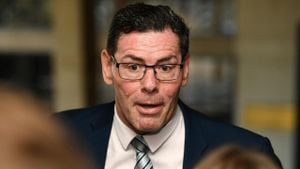British Columbia's political scene is buzzing with excitement as the BC Conservative Party reveals its new shadow cabinet, showcasing the talents and expertise of its members. This recent announcement came from party leader John Rustad, who emphasized the commitment of this diverse group to tackle pressing issues facing the province.
On November 20th, Rustad introduced the shadow cabinet, which includes notable figureheads from various regions, including the Peace River area. Aaliya Warbus, representing Chiliwack-Cultus Lake, takes on the role of house leader within this newly formed cabinet. During his presentation, Rustad stated, "Our shadow cabinet is a dynamic team of talented individuals ready to hold David Eby’s disastrous government accountable and present a strong alternative vision for British Columbia."
The cabinet's structure features significant roles for Peace River MLAS. Jordan Kealy, representing Peace River North, has been designated as the Shadow Minister for Agriculture Expansion and Food Security. Meanwhile, Larry Neufeld, the MLA for Peace River South, has been named the Shadow Minister for Natural Gas and LNG. Each of these MLAS brings unique professional backgrounds to their roles, enhancing their capability to address the specific challenges tied to their portfolios.
Kealy's focus on agriculture reflects his commitment to ensuring food security for British Columbians, especially as the province faces changing climates and supply chain challenges. Neufeld's role concerning natural gas highlights the province's continued reliance on fossil fuels, alongside transitioning to more sustainable alternatives. Rustad reiterated his confidence, stating, "With experts in every field, we are focused on delivering real solutions for the challenges our province faces." This sentiment resonates strongly with the broader Conservative vision of prosperity, public safety, and affordability.
These appointments occurred just after the recent provincial elections, which saw shifts in boundaries leading to new representatives for Langley as well, where two of the three new Conservative MLAS have also received significant roles. Harman Bhangu has stepped up as the MLA responsible for transportation, bringing with him 15 years of substantial experience within the heavy-load trucking and construction industry. His real-world qualifications are seen as particularly advantageous for addressing the infrastructure needs of BC.
Alongside Bhangu, Misty Van Popta assumes the shadow cabinet position of infrastructure and construction. After serving on the Township council, she plans to continue her work at both levels, signifying her dedication to local governance. Despite facing some criticism for this dual commitment, she has expressed her intention to prioritize the needs of her constituents, stating, "We need to have more consultation with the cities before we put these top-down edicts down." This reinforces her outlook on engaging with community needs versus imposing provincial mandates.
Interestingly, Jody Toor, the MLA for Langley-Willowbrook, did not secure a seat in Rustad's shadow cabinet, but he may still be appointed to leadership roles following future caucus meetings. The shadow cabinet is expected to announce more leadership positions after discussions between party members on November 21st. Rustad mentioned this opportunity for additional appointments with optimism, believing it will enrich their ability to challenge the current government's policies.
Another point of contention arose when the NDP accused the Conservative party members of double dipping, especially highlighting Van Popta's dual roles as MLA and Township Councillor. Darlene Rotchford, the MLA for Esquimalt-Colwood, pressed the need for full-time commitments, insisting, "Being an MLA is a full-time job, and the people we represent deserve our undivided attention." This has intensified the dialogue surrounding the ethical obligations of elected officials managing responsibilities at multiple government levels.
Yet Rustad remains steadfast against criticism, asserting, "Our shadow cabinet is not just about filling seats; it is about assembling the right mix of talents to address the myriad challenges British Columbians face today. We have set our goals on health care, public safety, and alleviating the pressures related to housing and the cost of living." His clear focus on these issues tapers the criticisms directed at his caucus's dual commitments.
B.C.'s political dynamics are undoubtedly shifting, with the Conservative Party establishing its foothold as the leading opposition to the NDP's governance. The shadow cabinet is also strategic, both politically and practically, combining individuals from various sectors adept at addressing the multipliers of economic, social, and environmental challenges. The dialogue surrounding the cabinet's efficacy and its members' responsibilities will undoubtedly evolve as more decisions are made and policies are proposed.
All roads lead back to the collective aim of fostering community coherence, safety, and development throughout British Columbia. The spotlight now shifts to how effectively this shadow cabinet can petition for change, hold the current government accountable, and work toward its vision for the province's future.



